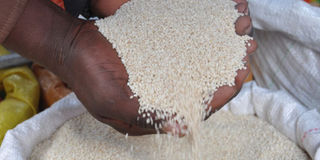Standards to promote sesame set

A shop attendant showing sesame seeds. A new standard to streamline the export of the sesame, a highly demanded commodity because of its diverse uses, has been developed. PHOTO BY ERONIE KAMUKAMA
What you need to know:
Standards to promote sesame as a product have been set. And when Ugandans comply, the country will cash in on the product, Dorothy Nakaweesi writes.
Ugandans with interest in exporting sesame - a high value oil seed - have been challenged to make use of the new standard to avoid rejection at the international market.
Sesame is a highly demanded commodity because of its diverse uses; as food in confectionary, paste, cooking oil, perfumery, cosmetics such as skin conditioning agents and moisturizers, hair preparation, bath oils, hand products and make up; pharmaceuticals, insecticides, paints and varnishes.
According to Mr Francis Enau, a Uganda National Bureau of Standards standards officer, exporters are required to comply with the standard.
“International markets like the European Union require exporters to follow the safety requirements at all stages of production,” Mr Enau said.
Experts say that exporters getting certification for having complied with the international standards is a plus to their companies as it gives them mileage and more customers.
Market
In 2015 the world market size for sesame was valued at $5.04 billion (Shs18.1 trillion), with China being the biggest importer at a tune of $1.16 billion (Shs4.1 trillion).
This is followed by USA, Japan, Germany, Turkey and South Korea. Uganda managed to fetch $55.1 million (Shs198 billion) worth of exports.
Uganda’s ranks number 18 in world exports of the product.
“We only captured 1 per cent of the global market. In effect 99 per cent of the market potential is still available,” Ms Noreen Kamoti, Uganda Export Promotion Board officer, shared.
On the continent, Ethiopia, Sudan, Nigeria, Burkina Faso, Togo and Tanzania are ahead of Uganda in supplying this product.
Opportunities
Experts say that there is a strong demand in the major consuming countries because of the continued health eating drivers in a number of developed countries such as oriental cuisine and fast foods.
“Sesame has multiple markets and uses by more than 200 countries. This creates an opportunity Ugandans can exploit,” Ms Kamoti said.
Also Uganda exporters enjoy trade benefits with access to eight preferential markets.
However, Ms Kamoti said that for Ugandans to benefit from these opportunities they have to develop a commercial mindset and move away from the substance nature of farming.




